Veterinary Drugs
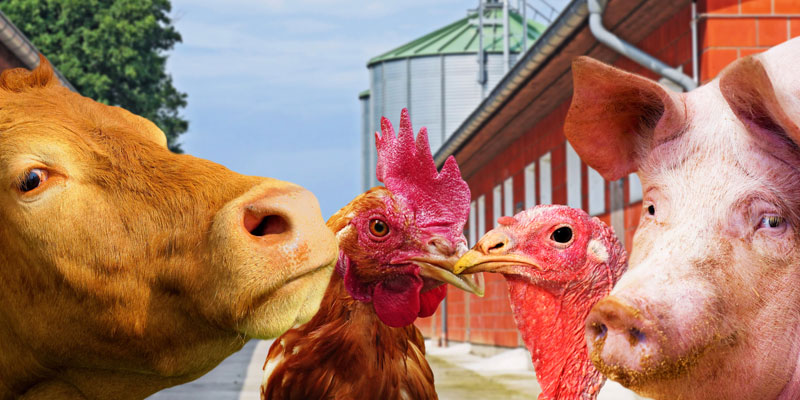
Health of animals, companion and farm ones are important for their and for human life. Living together on limited space can easily transfer illnesses and parasites. Veterinary drugs, also known as medicinal products for veterinary use, veterinary medicine or veterinary medicinal products (VMPs), are substances or combinations of substances to treat, prevent or diagnose disease in animals.
Veterinary Drugs in Food
The EU works to support the development and authorisation of safe, effective and quality veterinary medicinal products for food producing and companion animals, ensuring their availability and guaranteeing the highest level of public health, animal health and environment. The law governing veterinary medicinal products in the EU sets standards to ensure adequate health protection and established Maximum Residue Limits (MRL’s) for certain drugs in target tissues and animal species and has also identified pharmacologically active compounds that are prohibited and considered a hazard at any level (EU regulation EC 37/2010; Commission Decision 2003/181/EC; 21CFR Part 556 Tolerances for Residues of New Animal Drugs in Food). The current legal framework for veterinary medicinal products and medicated feed have been replaced by Regulation (EU) 2019/6 on veterinary medicinal products and Regulation (EU) 2019/4 on medicated feed; the new regulations will apply from 28 January 2022. Shimadzu is offering the full solution for veterinary drugs testing.
Multi-residue veterinary drug analysis of >200 compounds using MRM Spectrum mode by LC-MS/MS
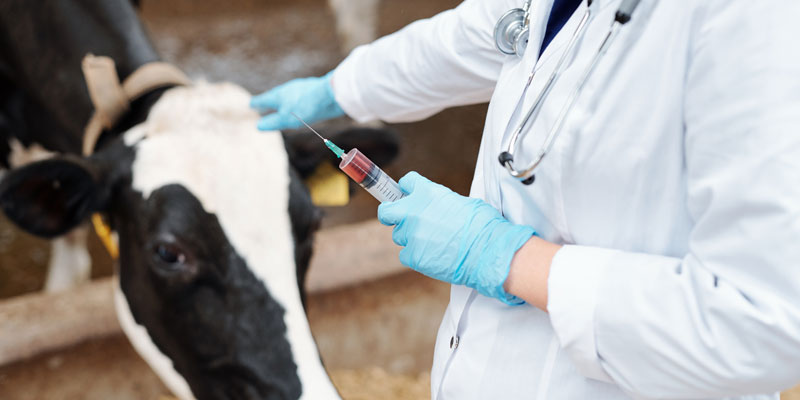
Veterinary drugs are used for therapeutic, metaphylactic, prophylactic and growth promotion purposes. Shimadzu has developed a method using the highly sensitive and selective triple quadrupole mass spectrometer LCMS-8060 together with MRM Spectrum mode to reduce false positive and false negative reporting in multi-residue veterinary drug analysis of food samples such as beef, egg, milk, salmon and more.
Fast Quantitative Analysis of Aminoglycoside Antibiotic Residues in Meat, Eggs and Milk and Identity Confirmation with MRM Spectrum Mode
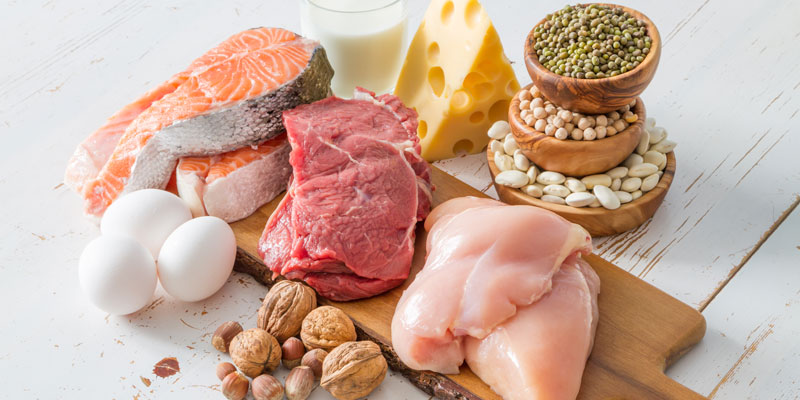
Aminoglycosides are an antibiotic family widely used for the treatment of bacterial infections in cattle, sheep, pigs and poultry. Regulatory agencies have set maximum residue limits (MRL) for these compounds after veterinary use. Aminoglycosides are very polar compounds, and usually require the use of undesirable ion-pairing reagents with LC-MS/MS.Shimadzu has developed a Method Package as a complete solution for the simultaneous quantitative analysis of all regulated aminoglycosides by HILIC/MS/MS.
LC-MS/MS Method Package for Aminoglycoside Antibiotics
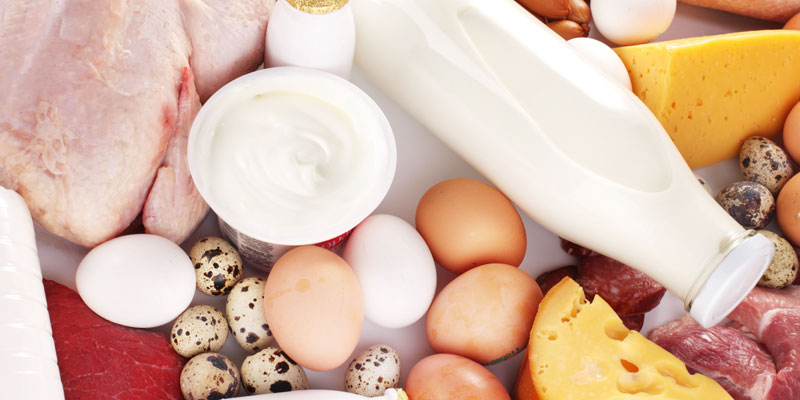
Complete method for fast quantitative screening of 13 aminoglycosides in meat, eggs and milk. Increase identification confidence with MRM Spectrum mode and LabSolutions Insight™ Screening. No ion-pairing reagent required. Includes single sample preparation protocol usable for meat, eggs and milk.
LC-MS/MS Method Package for Veterinary Drugs Ver. 2
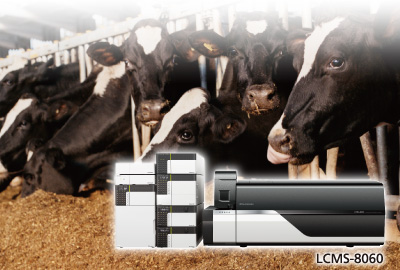
Veterinary drugs are used for therapeutic, metaphylactic, prophylactic and growth promotion purposes. To provide an assurance that food from animals is safe with regards to residues of veterinary medicines, regulatory authorities have established Maximum Residue Limits (MRL's) for certain drugs in target tissues and animal species. Some pharmacologically active compounds identified by regulatory authorities have been prohibited and maximum residue limits in foodstuffs of animal origin have been set in COMMISSION REGULATION (EU) No 37/2010 and published in the last consolidated version of 03/12/2020.
Veterinary Drugs in Pharma
There are many special developed pharmaceuticals for use in veterinary medicine and for prophylaxis against pathogens. At the same time feed additives and antibiotics are often used for faster growth and resistance vs. simple bacteria transmitted diseases. As applied for human pharmaceuticals, also for veterinary pharmaceuticals guidelines for development, testing and release are applied to ensure a safe use and the harmlessness. Those regulations are under frequent control, new (lower) acceptance levels for residuals are applied and the extensive use of antibiotics or hormones has been reduced step by step.
There are no major differences between human and veterinary pharmaceuticals in how the different steps in development look like. General strategy is somewhat similar: beside classic small molecules, biopharmaceuticals are now in development and already in use for several purposes. And, some relatively old developed pharmaceuticals which are not anymore applied for human purposes are still in use as their effectiveness has been proven in veterinary medicine.
Analytic gets important on several aspects – checking dosage of additives and applied veterinary drugs and verify that residuals in final food are below certain tolerance levels.
Analysis of antiparasitic agents using LC-MS
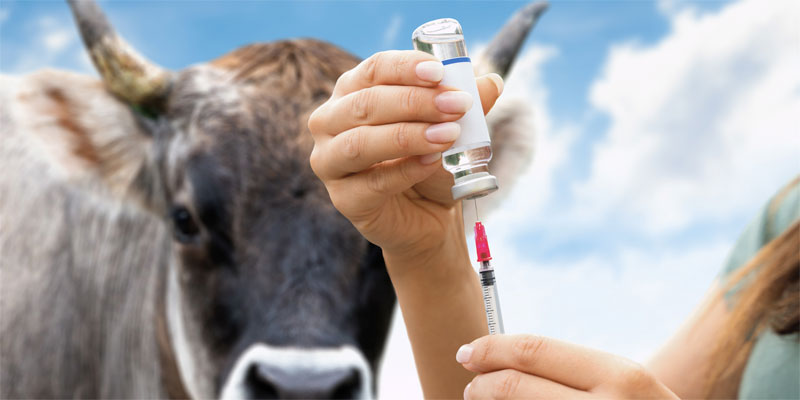
Veterinary pharmaceuticals including antibiotics and hormones are used to prevent disease in livestock, promote growth, and enhance the feed efficiency. Antiparasitic agents are also widely used to eliminate parasites from the alimentary canal. Residual standards are being established for antiparasitic agents as residual levels in meat present similar health problems to antibiotics and hormones. The four components used for this test were 5-hydroxythiabendazole, thiabendazole, flubendazole, and albendazole.
Multi-Residue Veterinary Drug Analysis of >200 Compounds using MRM Spectrum Mode by LC-MS/MS
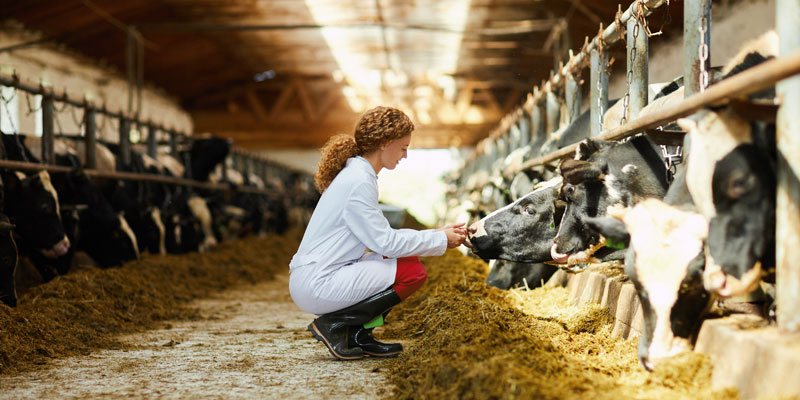
Veterinary drugs are used for therapeutic, metaphylactic, prophylactic and growth promotion purposes. To provide an assurance that food from animals is safe with regards to residues of veterinary medicines, regulatory authorities have established Maximum Residue Limits (MRL's) for certain drugs in target tissues and animal species. Some pharmacologically active compounds identified by regulatory authorities have been prohibited and their hazardousness at all levels are being considered (EU regulation EC 37/2010; Commission Decision 2003/181/EC; 21CFR Part 556 Tolerances for Residues of New Animal Drugs in Food). In this article, we describe how a triple quadrupole mass spectrometer, which is both highly sensitive and selective, contributes to reducing false positive and false negative reporting when using a measurement mode called MRM Spectrum mode.
Analysis of hormone agents for veterinary medication using LC-MS

We consume fish and meat as part of our normal daily diets and healthy human life would be impossible without nutrition from such foodstuffs. Consequently, not only a stable production and supply but safety of farm products, meat, and fish are demanded. Many agricultural chemicals and veterinary pharmaceuticals are currently used to increase productivity, but their residues in food are a problem. This report describes an analysis example of hormones used for livestock. Hormones are used to promote growth in livestock and their safety is investigated in the same way as antibiotics and antiparasitics. The residual standards are established according to the level harmless to humans.


